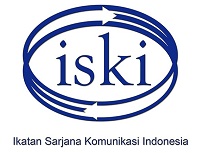The rhetorical messages of Megawati Soekarnoputri’s speech in Aristotle’s framework
Abstract
Background: The speech by Megawati Soekarnoputri, the 5th President of Indonesia, commemorating the 50th anniversary of Partai Demokrasi Perjuangan Indonesia (PDIP), has sparked significant public debate. While critics argue her speech was overly critical of President Joko Widodo, others view it as constructive criticism. Therefore, it is significant to examine Megawati’s actual perspective on the incumbent president and the real relationship between her position as chairperson and the president’s status as her cadre. Purpose: This study aims to analyze Megawati’s speech to uncover whether there is a misalignment between its intended message and impact which may have led to controversy. It analyzes the interpretation of people outside PDIP based on Aristotle’s rhetorical framework—ethos, logos, and pathos—to assess her communication strategy and public reception. Methods: A descriptive qualitative approach was used, with special interviews to gain a broader perspective. Triangulation was achieved by involving informants, along with observations, juxtaposing it with previous related research. Results: Based on the research findings, the author discovered that Megawati’s speech functioned primarily to communicate internally with the party’s members within her role as the chairperson. Based on rhetorical frameworks, the speech was exclusive to the internal context, and it could have been misinterpreted by people beyond the intended audience if the message had been amplified by mass and social media channels. Conclusion: The controversy arose because some receptors were not intended to receive her message due to massive distribution to the public either by mass media or social media. Implications: Interpretation of Megawati’s speech must be contextualized within the internal framework of PDIP reflecting its distinctive cultural and tradition attributes. The media outlets that cover this event should adopt a more balanced approach to present the realities to the public.
Keywords
Full Text:
PDFReferences
Ahmed, S.K. (2024). The pillars of trustworthiness in qualitative research. Journal of Medicine, Surgery, and Public Health, 2. https://doi.org/10.1016/j.glmedi.2024.100051.
Aida, N. R., & Pratiwi, I. E. (2023, November 1). Ramai dibahas warganet, berikut 10 Poin Pidato Megawati Saat HUT Ke-50 PDI-P Artikel ini telah tayang di Kompas.com dengan judul “Ramai Dibahas Warganet, Berikut 10 Poin Pidato Megawati Saat HUT Ke-50 PDI-P. Kompas.Com. https://www.kompas.com/tren/read/2023/01/11/212000965/ramai-dibahas-warganet-berikut-10-poin-pidato-megawati-saat-hut-ke-50-pdi-p
Ahlstrand, J.L. (2021). Strategies of ideological polarisation in the online news media: A social actor analysis of Megawati Soekarnoputri. Discourse & Society, 32(1), 64-80.
Aisyah, M. (2022). Ethos, pathos, logos dan komunikasi publik: A systematic literature review. Jurnal Darma Agung, 30(3), 442–469.
Anderson, W., & DiTunnariello, N. (2016). Aggressive humor as a negative relational maintenance behavior during times of conflict. The Qualitative Report. https://doi.org/10.46743/2160-3715/2016.2149
Ardiansyah, M. F. (2018). Analisis retorika Basuki Tjahaja Purnama dalam kampanye rakyat pemilihan kepala daerah khusus Ibukota Jakarta di Rumah Lembang 2017 (Kajian Retorika Aristoteles). Bapala, 5(1).
Aristotle, & Kennedy, G. A. (1991). On rhetoric: A theory of civic discourse. Oxford University Press. https://books.google.co.id/books?id=__UkAQAAMAAJ
Bartscherer, S. F. (2023). Emotion in british politics – a mixed methods analysis of Conservative and Labour Party speeches from 1900–2019. European Politics and Society, 24(5), 680–702. https://doi.org/10.1080/23745118.2022.2081016
Basu, S. (2024). “Laughing at us.” The European Journal of Humour Research, 12(1), 15–40. https://doi.org/10.7592/EJHR.2024.12.1.833
Beso, A. J., & Rahmawati, R. (2021). Hubungan eksekutif dan legislatif pada era Presiden Joko Widodo Periode 2014-2019. JURNAL POLINTER: KAJIAN POLITIK DAN HUBUNGAN INTERNASIONAL, 6(2), 89–112.
Blumler, J. G., & Esser, F. (2019). Mediatization as a combination of push and pull forces: Examples during the 2015 UK general election campaign. Journalism, 20(7), 855–872. https://doi.org/10.1177/1464884918754850
Budiasih, I., & Nyoman, G. A. (2014). Metode grounded theory dalam riset kualitatif. Jurnal Ilmiah Akuntansi Dan Bisnis, 9(1), 19–27.
Carvalho, J., Duarte, M.C. & Ruedin, D. (2024), Follow the media? News environment and public concern about immigration. European Journal of Political Research.
Charmaz, K., & Thornberg, R. (2021). The pursuit of quality in grounded theory. Qualitative Research in Psychology, 18(3), 305–327. https://doi.org/10.1080/14780887.2020.1780357
Coles, G. (2018). “What do i lack as a woman?”: The rhetoric of Megawati Sukarnoputri. Rhetorica, 36(1), 58–91. https://doi.org/10.1525/rh.2018.36.1.58
Cominetti, F., Gregori, L., Vallauri, E. L., & Panunzi, A. (2024). IMPAQTS: a multimodal corpus of parliamentary and other political speeches in Italy (1946-2023), annotated with implicit strategies. PARLACLARIN. https://api.semanticscholar.org/CorpusID:269950691
Cooper, C. D., & Hiller, N. (2023). Leader humor across levels. Current Opinion in Psychology, 53, 101688. https://doi.org/10.1016/j.copsyc.2023.101688
Dewi, S. F. (2017). Sosiologi_Politik. Gre Publishing.
Dhia, R. N., Pramesthi, J. A., & Irwansyah, I. (2024). Analisis retorika aristoteles pada kajian ilmiah media sosial dalam mempersuasi publik. Linimasa : Jurnal Ilmu Komunikasi. https://api.semanticscholar.org/CorpusID:272078322
Dicioccio, R. L. (2012). Humor communication: Theory, impact, and outcomes. https://api.semanticscholar.org/CorpusID:141954325
Dickson, E. S., & Scheve, K. (2006). Social identity, political speech, and electoral competition. Journal of Theoretical Politics, 18(1), 5–39. https://doi.org/10.1177/0951629806059594
Dirdjosisworo, S. (1999). Megawati dalam babar sejarah pemimpin perempuan Indonesia. Mandar Maju.
Ferlien, Y., & Rumaf, N. (2020). Analisis pidato Prabowo Subianto dalam perspektif analisis wacana kritis. FRASA: Jurnal Keilmuan, Bahasa, Sastra, Dan Pengajarannya, 1(2), 100–120.
Gonçalves, A. R., Fernandes, C., Pasion, R., Ferreira-Santos, F., Barbosa, F., & Marques-Teixeira, J. (2018). Effects of age on the identification of emotions in facial expressions: a meta-analysis. PeerJ, 6, e5278. https://doi.org/10.7717/peerj.5278
Gunanto, D. (2020). Tinjauan kritis politik dinasti di Indonesia. Sawala : Jurnal Administrasi Negara, 8(2), 177–191. https://doi.org/10.30656/sawala.v8i2.2844
Hady, N. (2022). Rekonstruksi sistem demokrasi lokal di Indonesia. Jurnal Ilmiah Pendidikan Pancasila Dan Kewarganegaraan, 7(2), 357–366.
Hanan, D., & Irvani, D. (2022). The coattail effect in multiparty presidential elections. Asian Survey, 62(2), 240–268. https://doi.org/10.1525/as.2022.1501924
Harmon, D. J., Green, S. E., & Goodnight, G. T. (2015). A model of rhetorical legitimation: The structure of communication and cognition underlying institutional maintenance and change. The Academy of Management Review, 40(1), 76–95. http://www.jstor.org/stable/43700543
Hingkua, M., Buhaerah, N., & Nurfaidah, N. (2021). Pengaruh gaya kepemimpinan dan komunikasi internal terhadap efektivitas kerja pegawai pada Kantor Dinas Parawisata dan Pemuda Olahraga Kabupaten Morowali Utara. MM Journal, 2(1), 188–208.
HOEFER, R. L., & GREEN, S. E. (2016). A rhetorical model of institutional decision making: the role of rhetoric in the formation and change of legitimacy judgments. The Academy of Management Review, 41(1), 130–150. http://www.jstor.org/stable/43699322
Howland, M., & Simpson, J. A. (2014). Attachment orientations and reactivity to humor in a social support context. Journal of Social and Personal Relationships, 31(1), 114–137. https://doi.org/10.1177/0265407513488016
Hühn, M. P., & Meyer, M. (2023). Sophistry or wisdom in words: Aristotle on rhetoric and leadership. Business Ethics, the Environment & Responsibility, 32(2), 544–554. https://doi.org/10.1111/beer.12516
Infante, D. A. (1987). Arguing constructively. Waveland Press.
Irena, L., & Rusfian, E. Z. (2019). Hubungan gaya kepemimpinan transformasional dan komunikasi internal dengan kinerja karyawan generasi Z pada tech company. Jurnal Komunikasi, 11(2), 223–232.
Isa, A. T. H. (2022). Analisis bukti retorika pidato Nadiem Makarim pada Hari Guru Nasional 2019. Jurnal Lensa Mutiara Komunikasi, 6(1), 127–138.
Julkifli, J., & Wibawa, S. (2022). Masalah-masalah yang muncul dalam penyelenggaraan pemilu di Indonesia. Serunai: Jurnal Ilmiah Ilmu Pendidikan, 8(2).
Jungherr, A., Posegga, O., & An, J. (2019). Discursive power in contemporary media systems: A comparative framework. The International Journal of Press/Politics, 24(4), 404–425. https://doi.org/10.1177/1940161219841543
Kalmoe, N. P., & Mason, L. (2024). Threats as political communication. Political Communication, 41(1), 162–171. https://doi.org/10.1080/10584609.2023.2270539
Karahan, T. F., Yalcin, B. M., Erbas, M. M., & Ergun, S. (2019). The relationship between the dominant humor style, emotional intelligence, and problem-solving skills in trainee teachers in Turkey. HUMOR, 32(1), 73–95. https://doi.org/10.1515/humor-2017-0083
Kompas.id. (2022, June 9). Jokowi ibaratkan relasinya dengan Megawati seperti Ibu dan Anak. Kompas.Id. https://www.kompas.id/baca/polhuk/2022/06/08/jokowi-ibaratkan-relasinya-dengan-megawati-seperti-ibu-dan-anak
Konat, B., Gajewska, E., & Rossa, W. (2024). Pathos in natural language argumentation: Emotional appeals and reactions. Argumentation, 38(3), 369–403. https://doi.org/10.1007/s10503-024-09631-2
Kristiyanto, H., Arinanto, S., & Ghafur, H. S. (2023). Institutionalization and party resilience in Indonesian electoral democracy. Heliyon, 9. https://api.semanticscholar.org/CorpusID:265492208
Laksono, I. S. S., Hamamah, H., & Chojimah, N. (2020). Persuasive strategy in prabowo’s political speech at national agenda 2019. Nusa: Jurnal Ilmu Bahasa Dan Sastra, 15(2), 214–224.
Lesmana, T. (2009). Dari Soekarno Sampai SBY : Intrik dan lobi politik penguasa. Gramedia Pustaka Utama.
Ludvianto, M., & Arifani, W. (2020). Retorika persuasif dalam debat calon presiden Indonesia 2019: Sebuah analisis komunikasi performatif. Jurnal Ilmu Komunikasi (J-IKA), 7(1), 41–50.
Luhukay, M. (2007). Presiden SBY dan politik pencitraan : Analisis Teks Pidato Presiden SBY dengan Pendekatan Retorika Aristoteles.
Lyu, S., & Yuan, W. (2023). Perception of implicit promise in face-threatening contexts. Journal of Pragmatics, 208, 53–71. https://doi.org/10.1016/j.pragma.2023.02.011
Maier, J., & Nai, A. (2022). When conflict fuels negativity. A large-scale comparative investigation of the contextual drivers of negative campaigning in elections worldwide. The Leadership Quarterly, 33(2), 101564. https://doi.org/10.1016/J.LEAQUA.2021.101564
Mendiburo-Seguel, A., Olah, A. R., Paez, D., & Navia, P. (2024). Laughing your vote off: the impact of candidates’ humor on voters’ emotions and intentions. Frontiers in Political Science, 6. https://doi.org/10.3389/fpos.2024.1398686
Miskolczy, I., & Gherghina, S. (2024). Making words harmless: Why politicians survive character assassination attacks. The British Journal of Politics and International Relations, 0(0).
Moeller, J., de Vreese, C., Esser, F., & Kunz, R. (2014). Pathway to political participation. American Behavioral Scientist, 58(5), 689–700. https://doi.org/10.1177/0002764213515220
Muhtadi, B. (2023). Jokowi’s high approval ratings make him potential king-maker’. ISEAS Perspective 38, ISEAS Yusof Ishak Institute, Singapore.
Nai, A., Tresch, A. & Maier, J. (2022). Hardwired to attack. Candidates’ personality traits and negative campaigning in three European countries. Acta Polit 57, 772–797 (2022).
Nas Daily. (2020). What i learned from a trump rally. https://www.youtube.com/watch?v=5gx9Hz8zVYc
Nasution, A. F. (2023). Metode penelitian kualitatif. Harfa Creative.
Natow, R.S. (2020). The use of triangulation in qualitative studies employing elite interviews. Qualitative Research, 20(2), 160-173.
Oktay, J. S. (2012). Grounded Theory. Oxford University Press, USA. https://books.google.co.id/books?id=kYCZ0MQ8ceIC
Perloff, R. M. (2016). The dynamics of persuasion. Routledge. https://doi.org/10.4324/9781315657714
Plantin, J., & Punathambekar, A. (2019). Digital media infrastructures: pipes, platforms, and politics. Media, Culture & Society, 41, 163–174. https://api.semanticscholar.org/CorpusID:150113853
Prakoso, I. (2019). Kesantunan dan solidaritas dalam prespektif komunikasi lintas budaya pada masyarakat Jawa dan Kei. SHAHIH: Journal of Islamicate Multidisciplinary, 4(2), 123–137. https://doi.org/10.22515/shahih.v4i2.1859
Pranowo, N., & Yanti, N. T. A. (2019). Wujud dan makna pragmatik bahasa nonverbal dalam komunikasi masyarakat Jawa: Kajian etnopragmatik. Linguistik Indonesia. https://api.semanticscholar.org/CorpusID:212891904
Riesardhy, A. & Suryatini, N.W. (2024). Aristotle’s rhetoric of megawati soekarnoputri’s political speech at the opening of rakernas II PDIP. MEDIASI Jurnal Kajian dan Terapan Media, Bahasa, Komunikasi.
Rosalin, S., Natalia, D. C., & Ambulani, N. (2020). Komunikasi bisnis: Pendekatan praktis. Universitas Brawijaya Press.
Rountree, J., Lawrence, W. Y., & Drury, S. A. M. (2023). Rhetorical alignment between political campaign discourse and democratic deliberation. Journal of Deliberative Democracy, 19(1). https://doi.org/10.16997/jdd.1367
Rowland, R. C. (2019). The populist and nationalist roots of trump’s rhetoric. Rhetoric and Public Affairs, 22(3), 343–388. https://doi.org/10.14321/rhetpublaffa.22.3.0343
Sadler, N. (2021). Fragmented narrative. Routledge. https://doi.org/10.4324/9780429020889
Safitri, D. (2016). Woman and political communication: Megawati dan pemimpin simbolik. Jurnal Komunikasi, 9(1), 49–58.
Sihombing, S. Naomi. (2016). Peranan Megawati Soekarnoputri di panggung politik Indonesia 1987-2014 [PhD Thesis]. Unimed.
Soontjens, K., & Persson, M. (2024). Lacking incentives, not information. why politicians tend to be less responsive to lower‐income citizens. Legislative Studies Quarterly. https://doi.org/10.1111/lsq.12450
Sulistyarini, D., & Zainal, A. G. (2020). Buku Ajar: Retorika.
Sun, J., & Liu, Z. (2023). Evaluation mechanism of political discourse: A holistic approach. Journal of Psycholinguistic Research, 52(6), 2143–2179. https://doi.org/10.1007/s10936-023-09988-7
Supriatma, M., & Yew-Foong, H. (2022). 1. The 2019 Indonesian elections: A political déjà vu? In The Jokowi-Prabowo Elections 2.0 (pp. 1–18). ISEAS–Yusof Ishak Institute Singapore. https://doi.org/10.1355/9789815011371-004
Tatchou, C. N. (2022). The Mediatization of politics in cameroon: A political actor-centric approach. African Journalism Studies, 43(1), 107–126. https://doi.org/10.1080/23743670.2022.2044876
Triadafilopoulos, T. (1999). Politics, speech, and the art of persuasion: Toward an Aristotelian conception of the public sphere. The Journal of Politics, 61(3), 741–757.
Verhulsdonk, I., Nai, A., & Karp, J. A. (2022). are political attacks a laughing matter? Three experiments on political humor and the effectiveness of negative campaigning. Political Research Quarterly, 75(3), 720–737. https://doi.org/10.1177/10659129211023590
Wala’Al-Majali. (2015). Discourse analysis of the political speeches of the ousted Arab Presidents during the Arab Spring Revolution uing Halliday and Hasan’s Framework of Cohesion. https://api.semanticscholar.org/CorpusID:119065983
Wardani, S. (2019). Orasi politik Joko Widodo dan Prabowo Soebianto dalam pilpres 2019. Nyimak: Journal of Communication, 3(2), 107–121.
Wardaya, B. T. (2021). The influence of javanese political concept of power on President Sukarno. Paramita: Historical Studies Journal, 31(2). https://doi.org/10.15294/paramita.v31i2.28928
Widhana, D. H. (2016, December 4). Rachmawati vs Megawati. https://tirto.id/rachmawati-vs-megawati-b7dw
Winer, S., Ramos Salazar, L., Anderson, A. M., & Busch, M. (2024). Resolving conflict in interpersonal relationships using passive, aggressive, and assertive verbal statements. International Journal of Conflict Management, 35(2), 334–359. https://doi.org/10.1108/IJCMA-03-2023-0048
Wright, K. (2024). Position, salience and rhetoric: The strategic tools employed by the main Scottish political parties in the post-devolution era. British Politics. https://doi.org/10.1057/s41293-024-00257-2
Yulyfatun. (2016). Makna pesan komunikasi pada pidato politik megawati di rakernas-1 pdi perjuangan. Universitas Islam Sultan Agung.
Zaman, A. N. (2022). Kemunculan Jokowi di pentas politik nasional. KAIS Kajian Ilmu Sosial, 1(1), 43–53.
DOI: https://doi.org/10.24198/jkk.v12i2.57652
Refbacks
- There are currently no refbacks.
Copyright (c) 2024 Jaka Anindita, Ridwan Muttaqin, Sylvana Virgina Agustya, Dandi Supriadi

This work is licensed under a Creative Commons Attribution-NonCommercial-ShareAlike 4.0 International License.
Jurnal Kajian Komunikasi Indexed by:
Editorial Office of Jurnal Kajian Komunikasi:
Faculty of Communication Science, Universitas Padjadjaran
Jl. Raya Bandung-Sumedang Km. 21 Jatinangor, Sumedang 45363, Indonesia
WA: +6282316731181 (Chat Only)
Telephone: +62227796954
Faxmile: +62227794122
E-mail: jurnal.kajian.komunikasi@unpad.ac.id
Jurnal Kajian Komunikasi Supervised by:










